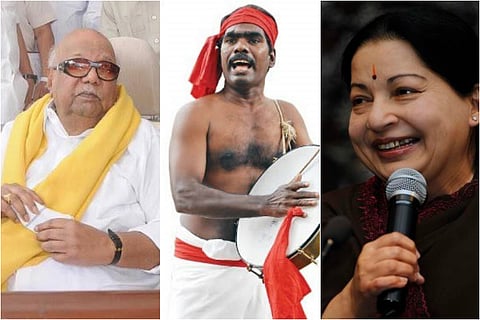

As ‘national’ media and popular discourse remain fixated on the ongoing Award Wapsi by people of eminence from different fields, democracy and dissent are being shred to pieces by the government in Tamil Nadu, in keeping with its tradition of stifling anti-state voices. A leftist political activist and folk-artiste, S Sivadas aka Kovan, has been arrested on charges of sedition, defamation and creating enmity between social groups. His crime: he sang two songs extremely critical of the ruling dispensation and its leader, blaming her for increasing alcoholism in the state.
Whether he is indeed guilty of breaching the law is now for the court to decide, but it is not unlawful for one to hold the opinion that such political dissent must be allowed in a democratic country. As is often said, the remedy to ‘bad speech’, if it is indeed so in this case, is ‘more speech’, not locking the person up under cooked-up charges. The song might indeed be crass, but it should be considered democratic.
But the arrest also represents, in several ways, the political scenario in the state of Tamil Nadu. The state is headed for Assembly polls in mid-2016, and political tempers are rising. But the ruling dispensation remains authoritarian, the opposition timid and democratic dissent is being threatened – and this incident is a perfect illustration of all that.
The authoritarian leader: You are either with me, or against me
The arrest of Kovan, and more importantly the charges which have been slapped on him, are perfect examples of how any dissent is stifled by the party in power. Be it the protests in Kudankulam or the more recent anti-liquor protest which Kovan was a part of, the Jayalalithaa government has cracked down hard on the protester using the powerful arms of the state. The cause can be genuine, but if it is against the diktat from the top, then it will not be tolerated. And this is the case both within the ruling party and outside of it.
A weak opposition
What Kovan was doing, should have been the job of the opposition – perhaps in a more polished manner but all the same. The issue of alcoholism, coupled with its social and economic impact on the state, was ripe to be that one issue which could have hurt the image of the Jayalalithaa government. But after the initial surge, the issue was allowed to fall by the wayside. Now it is only up to a few smaller organizations and groups to keep the issue alive. There is no political mobilisation on the issue from the major political parties of the state.
Further, the political opposition in the state must learn from Kovan as to how stinging, the criticism should be. He might get a little personal, but the range of issues he points out, the ironies that he brings out, can put any government to shame. This is what political parties must be doing. Vaiko made a good start in Trichy today by daring the government to arrest him after mouthing Kovan’s lyrics.
Social and economic reality of the state
Kovan’s songs are not just rants, but well-thought-out political expositions. The price of common commodities is increasing, but the government is making money off alcohol on the one side and showering freebies on the other. In effect, while the government is encouraging alcoholism, it is making them more dependent on the state for survival. And therein lays the reality of the state and principal failure of the government.
Dissent is alive, but only for those who are willing to risk their lives
This also shows that not all is lost in Tamil Nadu, after nearly 5 years of iron-fisted rule. Dissent is alive and kicking, albeit only for those who are willing to risk it. Kovan might just as well have been an unknown activist, but that he was willing to stick his neck out and voice his opinion shows that there are those who are capable of doing so. Scathing criticism is an intrinsic part of a democracy, and one hopes that this incident will only inspire more dissent in the state.
The protest must be anti-TASMAC, not anti-alcohol
Another point which one would notice when Kovan’s song is closely observed is that his attack is on TASMAC, not alcohol. This is an important distinction. Yes, alcoholism is destroying lives and families, but it is not alcoholism by itself, but the proliferation of it by the state to keep its coffers filled up. By calling for a blind, all-out ban on alcohol, political parties were barking up the wrong tree. It is in attacking the state’s financial interest in selling alcohol that the real political narrative exists, especially since state monopoly on liquor itself was an idea mooted by the Jayalalithaa government.